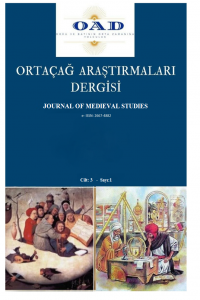Abstract
Öz
Yaşadığı coğrafyanın bir parçası olan insanoğlu, onun kendisine sunmuş olduğu imkânlar ışığında ilerlemenin yollarını bulabilmektedir. Bu bağlamda uçsuz bucaksız Moğolistan coğrafyasına ayak uydurmuş Moğol toplumunun gelişimi, hatta hayatını idame ettirebilmesi sahip olduğu hayvan sürülerinin güvenliğine bağlıydı. Bunu gerçekleştirebilmesi için yaz kış demeden taze otlaklar bulabilmek maksadıyla hayvan sürülerinin peşinden hareket etmek durumundaydı. Bu hayat tarzının önemli bir parçası olan kışlaklar, bilhassa yükseltisi az, korunaklı, iklimi ılıman olan ve yeşil otlaklara sahip yerlerdi. Dolayısıyla hem kendileri hem de hayvan sürüleri için hayati önem taşırdı.
1220’li yıllardan itibaren İran ve Azerbaycan topraklarında görünmeye başlayan Moğollar, kalabalık ordu ve büyük hayvan sürülerini barındıracak yaylak ve kışlakları bulma konusunda sıkıntı çekmediler. Zira bu bölge zengin su kaynakları, yüksek platolarında her mevsim yeşil çayırlarıyla geldikleri ülkeyi aratmıyordu. Özellikle Arran ve Mugan, zengin kaynaklarının yanı sıra, stratejik konumuyla da Moğol komutanlarının dikkatinden kaçmamıştı. Artık sayısız Türk ve Moğol aşiretlerine kışlak vazifesi görecek olan bu yerler, İlhanlı devletinin tesisiyle saray ve şehirlerin inşa edildiği daimi karargâhlar haline gelecektir. Hülegü’den itibaren tüm İlhanlı hükümdarlarının genellikle kışlak olarak tercih ettiği Arran ve Mugan, devletin yıkılışına kadar bu önemini muhafaza etmiştir. Öyle ki, devletin merkezi otoritesinin zayıfladığı ve hatta bölgesel iktidarların hüküm sürdüğü zamanlarda bile Arran ve Mugan’ın hazineye küçümsenmeyecek miktarlarda vergi gönderdiği kaydedilmektedir.
Anahtar Kelimeler: Moğol, Kışlak, Arran, Mugan, Azerbaycan.
Qıshlaq Tradıtıon ınThe Mongols: Sample The Arran and Mughan Qıshlaqs of Ilkhanıds
Abstract
Being a part of the place where he lives, mankind can find ways to progress thanks to the opportunities it offers him. At this point, development of the Mongolian society, that kept pace in the vast Mongolia geography an deven being able to survive dependent on the safety of herds of animals. In order to do this, he had to go after herds of aanimals to find fresh pastures in winter and summer. Winter areas which were importand parts of this lifestyle, were places which especially were places being low, safe, mild climate and having green pastures. Therefore, it was vital for both themselves and herd of animals.
Mongols who started to appear in Persian and Azarbaijan since the 1220 had to trouble finding highlands and barracks to accomodate to crowded army and long herds of animals. Because this region made the country where they came not to be missed with its rich water resources and green pastures in high plateaus in all seasons. Especially Arran and Mugan did not escape the attentionof Mongolian commanders with its rich resources es well as its strategic location. Turkish and Mongolian tribes, would become permanent headquarters where palaces and cities would be built with the establishment of the Ilkhanid state. From Hülegü, Arran ve Mugan where all rulers of Ilkhanids state generally preferred as winter places maintained this importance until collapse of the state. So that, it was recorded that Arran and Mugan send tax to the treasury of state in substantial amounts when the central autharity of the state weakened an deven regional Powers prevail.
Keywords: Mongol, Qıshlaq, Arran, Mugan, Azarbaijan.
References
- Uzunçarşılı, İ. Hakkı, Osmanlı Devleti Teşkilatına Methal, TTK Yayınları, Ankara 1998. Vladimirtsov, B. Y., Moğolların İctimai Teşkilatı Moğol Göçebe Feodalizmi, (Çev. Abdülkadir İnan), TTK Yayınları, Ankara 1995.
Abstract
Being a part of the place where he lives, mankind can find ways to progress thanks to the opportunities it offers him. At this point, development of the Mongolian society, that kept pace in the vast Mongolia geography an deven being able to survive dependent on the safety of herds of animals. In order to do this, he had to go after herds of aanimals to find fresh pastures in winter and summer. Winter areas which were importand parts of this lifestyle, were places which especially were places being low, safe, mild climate and having green pastures. Therefore, it was vital for both themselves and herd of animals.
Mongols who started to appear in Persian and Azarbaijan since the 1220 had to trouble finding highlands and barracks to accomodate to crowded army and long herds of animals. Because this region made the country where they came not to be missed with its rich water resources and green pastures in high plateaus in all seasons. Especially Arran and Mugan did not escape the attentionof Mongolian commanders with its rich resources es well as its strategic location. Turkish and Mongolian tribes, would become permanent headquarters where palaces and cities would be built with the establishment of the Ilkhanid state. From Hülegü, Arran ve Mugan where all rulers of Ilkhanids state generally preferred as winter places maintained this importance until collapse of the state. So that, it was recorded that Arran and Mugan send tax to the treasury of state in substantial amounts when the central autharity of the state weakened an deven regional Powers prevail.
References
- Uzunçarşılı, İ. Hakkı, Osmanlı Devleti Teşkilatına Methal, TTK Yayınları, Ankara 1998. Vladimirtsov, B. Y., Moğolların İctimai Teşkilatı Moğol Göçebe Feodalizmi, (Çev. Abdülkadir İnan), TTK Yayınları, Ankara 1995.
Details
| Primary Language | Turkish |
|---|---|
| Journal Section | Research Articles |
| Authors | |
| Publication Date | June 25, 2020 |
| Submission Date | April 2, 2020 |
| Published in Issue | Year 2020 Volume: 3 Issue: 1 |
Cite
Articles published in Ortaçağ Araştırmaları Dergisi are licensed under a Creative Commons Attribution-NonCommercial 4.0 International License (CC BY-NC 4.0). Ortaçağ Araştırmaları Dergisi provides immediate open-access to its content, reflecting its conviction in advancing global knowledge exchange. The opinions presented in the articles are the sole responsibility of their respective authors and do not present the view or opinions of Ortaçağ Araştırmaları Dergisi. Terms of Use & Privacy Policy




